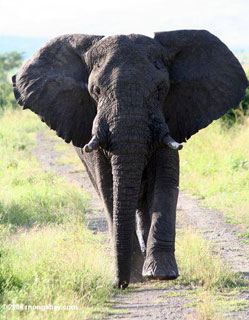Elephants respond to calls from friends, not strangers
mongabay.com
June 5, 2007
Elephants can distinguish between friendly calls and those of strangers reports a new study covered in ScienceNOW Daily News.
In 2004 Caitlin O’Connell-Rodwell of Stanford University discovered that elephants use low-frequency, partially infrasonic ground vibrations to communicate with each other from miles away. The pachyderms press their trunks against the ground to detect the “calls.”
Now in a follow up study, O’Connell-Rodwell has found that elephants respond only to calls from elephants they know. Calls from unknown elephants are ignored.

Photo by Rhett A. Butler. |
According to ScienceNOW, O’Connell-Rodwell’s team “recorded alarm calls made by elephants encountering lions in Kenya and Namibia.” These sounds were then converted into seismic waves and played elephants in Namibia.
“The elephants responded to the Namibian vibrations by freezing, huddling, and leaving the area sooner. The elephants appeared to detect the Kenyan calls–they sometimes paused and looked more alert, for instance–but did not react dramatically,” writes Betsy Mason of ScienceNOW.
O’Connell-Rodwell said she doesn’t know why elephants respond differently to the alarm calls, but it may be that “elephants trust the calls from animals they know but not those of strangers.”
The research will be published in the August issue of the Journal of the Acoustical Society of America.
CITATION: Betsy Mason (2007). “Rumble, Rumble. Who’s There?” ScienceNOW Daily News June 4, 2007.